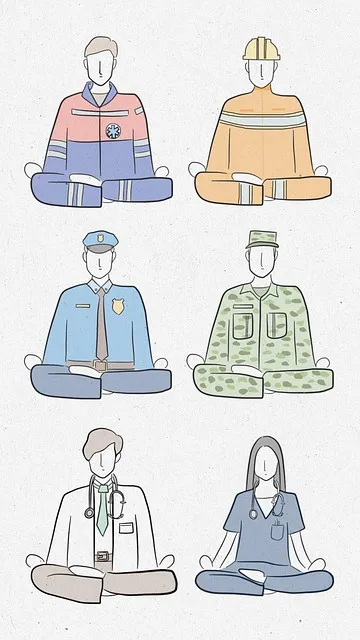Crisis Intervention Teams (CITs) at Northglenn Kaiser Permanente have proven effective in de-escalating mental health crises, as attested by positive psychiatry reviews. Training programs offer interactive workshops, simulations, and theoretical learning, equipping staff with skills like emotional regulation strategies and community outreach. The reviews highlight cultural sensitivity and evidence-based approaches, promoting mental health education to reduce stigma. These programs enhance professionals' abilities to handle high-stress situations, improve patient outcomes, and foster inclusive communities where seeking help is encouraged without judgment.
In today’s demanding healthcare landscape, Crisis Intervention Team (CIT) training programs are a vital resource for mental health care. This article delves into the crucial role of these programs in equipping healthcare professionals to handle crises effectively. We explore best practices through a lens of real-world examples, drawing insights from notable programs like Northglenn Kaiser Permanente Psychiatry Reviews. By understanding and implementing effective crisis intervention strategies, healthcare providers can significantly enhance patient outcomes and create safer environments.
- Understanding Crisis Intervention Teams: A Vital Resource in Mental Health Care
- The Role of Training Programs in Equipping Healthcare Professionals
- Northglenn Kaiser Permanente Psychiatry Reviews: Insights and Best Practices
- Implementing Effective Crisis Intervention Strategies in Real-World Scenarios
Understanding Crisis Intervention Teams: A Vital Resource in Mental Health Care

In today’s world, where mental health issues are increasingly recognized as a significant concern, Crisis Intervention Teams (CITs) stand as a vital resource in ensuring timely and effective support for individuals in crisis. These teams, typically composed of trained healthcare professionals, first responders, and community members, play a crucial role in de-escalating high-risk situations. At Northglenn Kaiser Permanente, psychiatry reviews highlight the success stories associated with CITs, underscoring their ability to stabilize vulnerable individuals and prevent further escalation.
The development of CITs is not merely a response to immediate crises but also contributes to broader public awareness campaigns aimed at improving mental health literacy. By fostering open dialogue and implementing community outreach program initiatives, these teams break down barriers associated with seeking help for mental health challenges. This proactive approach, coupled with the expertise offered by Northglenn Kaiser Permanente psychiatry professionals, ensures that individuals in crisis receive the compassionate and skilled care they deserve, ultimately enhancing self-esteem improvement and community resilience.
The Role of Training Programs in Equipping Healthcare Professionals

Training programs play a pivotal role in equipping healthcare professionals to handle crisis situations effectively. These programs, such as those offered by Northglenn Kaiser Permanente psychiatry departments, are designed to instill essential skills and knowledge in medical staff, enabling them to provide prompt and compassionate care during mental health crises. Through interactive workshops, simulations, and theoretical learning, participants gain a deep understanding of various crisis intervention techniques.
The focus often lies on principles like Mind Over Matter, which teaches patients emotional regulation strategies, fostering self-reliance and resilience. Additionally, these training programs highlight the importance of Community Outreach, empowering professionals to connect with individuals in diverse settings. By mastering these skills, healthcare providers can significantly improve patient outcomes, build stronger community ties, and create a more supportive mental health care ecosystem, as evidenced by positive psychiatry reviews from Northglenn Kaiser Permanente.
Northglenn Kaiser Permanente Psychiatry Reviews: Insights and Best Practices

The Northglenn Kaiser Permanente Psychiatry Reviews stand as a beacon of insight and best practices in crisis intervention team (CIT) training programs. These reviews, grounded in the expertise of leading psychiatrists within the organization, offer valuable lessons for enhancing mental healthcare services. By focusing on real-world scenarios and evidence-based strategies, the Northglenn Kaiser Permanente initiatives prioritize Cultural Sensitivity in Mental Healthcare Practice, reflecting a deep understanding of the diverse needs within communities.
The reviews also underscore the importance of well-designed Mental Health Education Programs, emphasizing their role in reducing the stigma associated with mental illness. Through these programs, participants gain critical skills to navigate complex situations and provide effective support during crises. By integrating Mental Illness Stigma Reduction Efforts into CIT training, Northglenn Kaiser Permanente Psychiatry Reviews demonstrate a commitment to fostering inclusive and compassionate communities where individuals feel empowered to seek help without fear of judgment or discrimination.
Implementing Effective Crisis Intervention Strategies in Real-World Scenarios

In today’s fast-paced world, effective crisis intervention strategies are more crucial than ever, especially within healthcare settings like Northglenn Kaiser Permanente psychiatry departments. Training programs that simulate real-world scenarios allow professionals to hone their skills in managing high-stress situations. These practical exercises not only enhance the ability to assess and de-escalate crises but also foster a deeper understanding of patient needs. By engaging in these realistic simulations, mental health workers can improve their decision-making abilities, ensuring they provide timely and effective interventions.
Self-esteem improvement, mood management, and confidence boosting are key aspects often addressed in such programs. Through role-playing and scenario-based learning, trainees learn to adapt their communication styles to suit diverse patient profiles, promoting a safe and supportive environment. The integration of these techniques into crisis intervention training equips professionals with the means to not only resolve acute crises but also lay the foundation for long-term mental wellness among patients.
Crisis intervention team training programs, such as those highlighted by the Northglenn Kaiser Permanente psychiatry reviews, play a pivotal role in equipping healthcare professionals to handle mental health crises effectively. By implementing best practices and strategies grounded in real-world scenarios, these programs ensure that teams are prepared to provide timely and compassionate care. Understanding the importance of these interventions is crucial for improving patient outcomes and fostering healthier communities.






